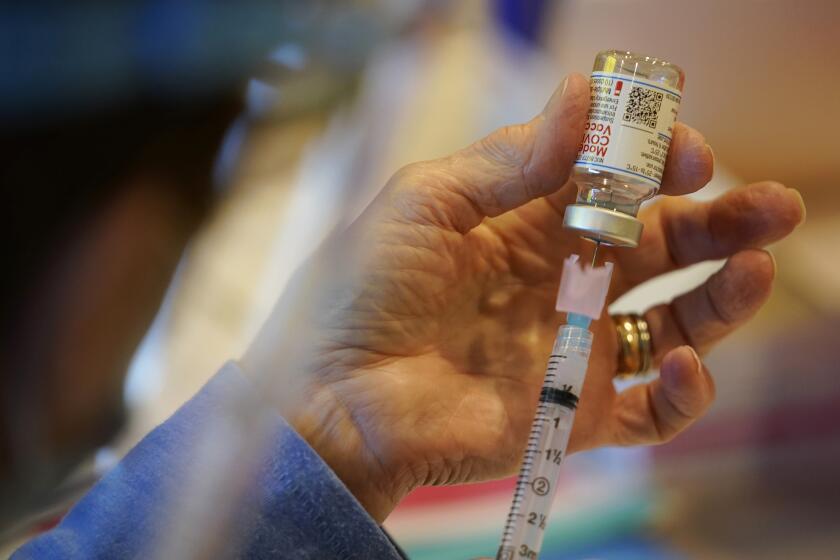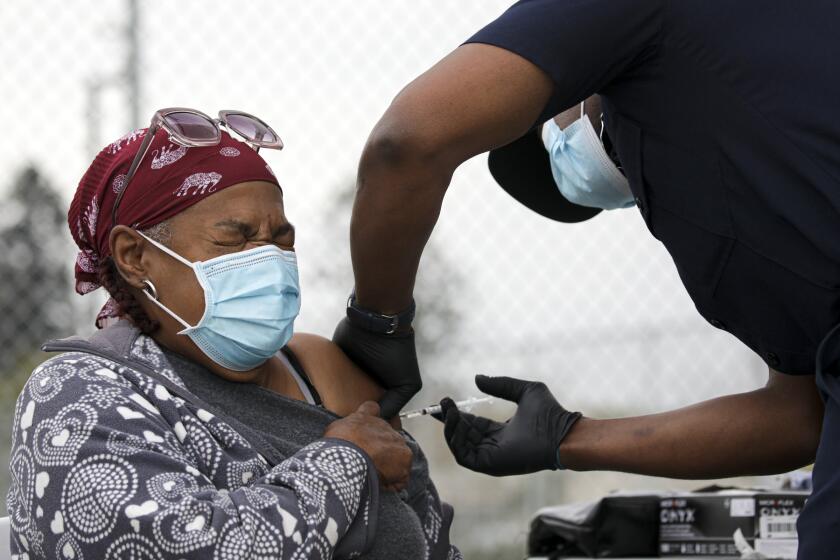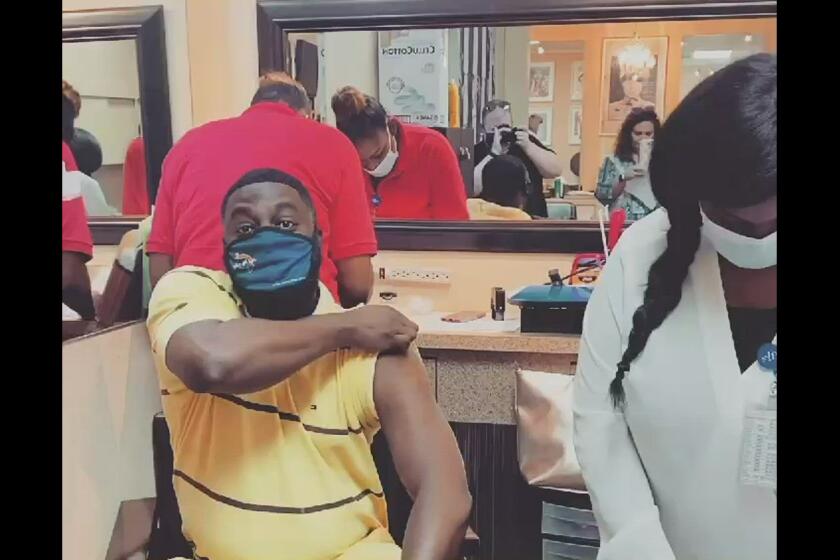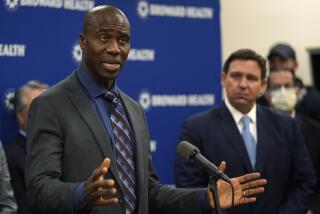Misinformation is killing people. Here’s the truth about COVID vaccines
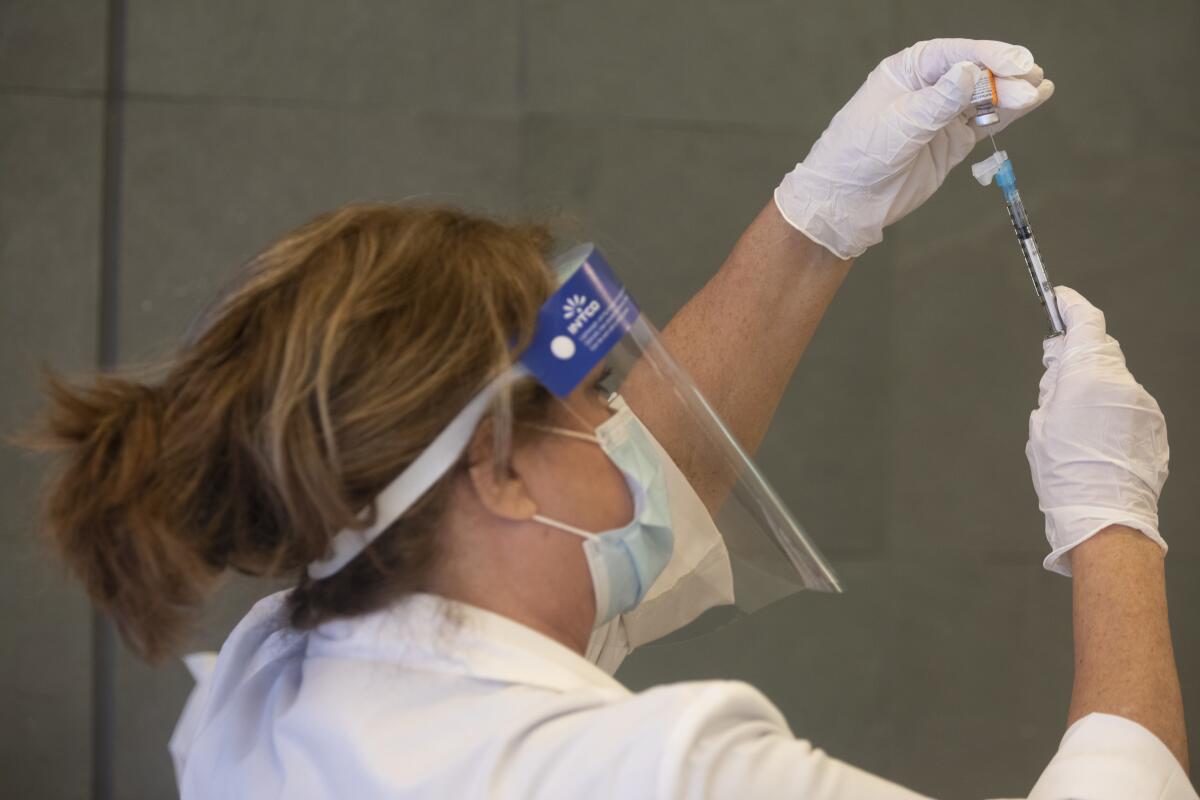
U.S. Surgeon General Vivek Murthy issued his first formal health advisory last week, warning Americans that misinformation about COVID-19 vaccines poses an “imminent and insidious threat to our nation’s health.”
Such advisories are typically used to flag the dangers of tobacco use or the opioid epidemic. Murthy’s was the first to target vaccine disinformation.
“Simply put, health misinformation has cost us lives,” he said.
The surgeon general’s warning came as many Americans’ reluctance — and sometimes downright refusal — to roll up their sleeves for the vaccination has left wide swaths of the country vulnerable to the more contagious Delta variant.
“The only pandemic we have is among the unvaccinated,” President Biden lamented last week.
Now, the overwhelming majority of COVID-19 deaths are among those who haven’t gotten the vaccination.
“It’s really sad and tragic that most all of these are avoidable and preventable,” Dr. Anthony Fauci, the nation’s top infectious disease expert, said this month on NBC’s “Meet the Press.”
Yet the misinformation continues to circulate, and vaccine doses remain unused. So we asked to two experts to evaluate four common arguments and explain why they’re wrong.
‘I’ve already had COVID, so I don’t need the vaccine.’
Surviving a bout of COVID-19 probably won’t protect you as effectively as a full course of COVID-19 vaccine, experts say.
“We know that the level of antibodies one gets from natural infection varies depending on the severity of their infection,” said Mercedes Carnethon, an epidemiologist at Northwestern University Feinberg School of Medicine. On the other hand, “we get a more robust and consistent response from the vaccine.” That makes it a better bet “for immunity over a long period of time,” she said.
It’s also unclear whether the antibodies you developed in response to a coronavirus infection will be able to recognize other variants of the virus.
Lab tests and real-world experience offer reassuring evidence that COVID-19 vaccines offer a high level of protection against the Delta variant.
“Somebody who had COVID at the beginning of the pandemic may have had a very different variant than what’s circulating right now,” Carnethon said. “The vaccines are demonstrating that they protect against the new variants.”
Even if you’ve had COVID-19, getting those shots is well worth it. Scientists have found that even a single dose of vaccine gives the immune system of a COVID-19 survivor a big boost.
‘We don’t know the vaccine’s long-term side effects.’
Historically, the vast majority of vaccine side effects occur not long after getting the shot, said Dr. Gabor Kelen, head of the emergency medicine department at Johns Hopkins University. Allergic reactions, which are rare, happen within moments; most other side effects emerge and dissipate within weeks.
“People need to chill about the long-term impact,” Kelen said. “The way immunology works is [if] something’s gonna happen, it’s gonna happen fairly soon,” he said.
The side effects of a second shot of COVID-19 vaccine are a sign that it’s providing more vigorous, long-lasting protection against the coronavirus.
What you really should be worried about are the long-term effects of a coronavirus infection, Carnethon said. She ticked off a few of the problems that plague the unfortunate people who suffer from long-haul COVID, including heart inflammation, fatigue and cognitive difficulties.
Throughout history, she said, “there’s been no vaccine that had worse side effects than the disease that it was developed to fight.”
‘I don’t need to be vaccinated because I’m young and healthy.’
Young people may be less likely to become seriously ill compared with senior citizens or people already dealing with chronic health problems, but it does happen. Young people end up in the hospital. They die. If they survive, they often have to live with debilitating symptoms for months, if not longer.
It’s not worth taking that chance — particularly when vaccinations are free to recipients and readily available, experts said.
“You’ll be fine — unless you’re not,” Carnethon said. “And it’s young adults who are seeing a little more of the long-haul COVID, which can interfere with your quality of life massively.”
Researchers are getting serious about understanding a disease patients call “long COVID.” Its symptoms include aches, fatigue, sleep problems and brain fog.
In some ways, the bigger problem is that younger adults with mild symptoms can spread the virus to others — especially elderly and vulnerable loved ones, who are more likely to develop severe COVID-19 and die from it.
“You’re ultimately going to give it to a friend [who] is going to get very, very sick, or make their grandmother very, very sick,” Kelen said. In the end, “you have no idea who you kill.”
‘It’s a personal choice to get vaccinated.’
“If that was all there is to it, I think all of us could shake our heads and say, ‘OK, you’re right, we can’t stop you from making bad decisions, we can just give the facts and advice,’” Kelen said.
But the problem with that argument is that “this is an infection where it’s not only about you,” he said. “If you don’t get vaccinated, it’s not only you who takes the risk. You risk a lot of people around you, including people you like and love.”
The Delta variant of the coronavirus has taken on a decidedly American feel, mainly targeting those who just won’t get vaccinated.
Plus, folks who don’t get vaccinated are providing the coronavirus with more opportunities to evolve in ways that make it better at spreading, better at making people seriously ill, and better at evading our medicines and vaccines. If any of those things happen, it will prolong the pandemic.
“We all want to get back to normal. We all want to be able to do the things that we used to be able to do regularly,” Carnethon said. “But by not getting vaccinated, now there’s someone else it can spread to and change itself further.”
